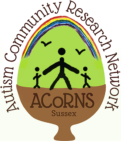By Prof Nicola Yuill
The topic for this session of the reading group was mental health, something that has loomed large in the news during Covid-19 restrictions. We had two readings, one giving figures for conditions that can affect many autistic people, such as Attention Deficit Hyperactivity Disorder, and the other being a very thoughtful blog from an autistic man describing his struggles with mental health.
Mental health and autism: same or different approach?
We kicked off with a discussion about the difficulties autistic people sometimes experience in getting mental health support. There are often separate ‘boxes’ for autism and mental health services, and we had a debate about whether a mental health issue might be ‘a part of the autism’ or something separate that requires specialist support. When that support is provided, does it need to be different for people on the autism spectrum? One example was of an autistic child who’d been given Cognitive Behavioural Therapy (CBT), which had gone very badly for them, and different approaches had to be used instead.

Similarly there can be overlaps between autism and mental health conditions such as eating disorders: does training and treatment need to be different? We’d certainly want to see clinicians having specialist training to understand better the particular needs of autistic people. We also raised the issue of autism awareness awards, such as used in West Sussex schools.
Talking about labels led to a discussion of Pathological Demand Avoidance, a controversial label applied to some autistic children in schools who cannot comply with requests and show extreme anxiety in the face of requests. The term does not have recognition from official diagnostic systems and is accepted by some groups but not others. The term itself suggests reasons why children show non-compliance, but more research is needed to understand what mechanisms are involved.
Person or situation?
Talking about labels led us to think about how much support for autistic children in schools has changed: the social model of disability is that the disability lies not in a person, but in the difficulties with a world that does not adapt to the needs of particular people. Thus, schools who are autism aware will consider things like whether the lights are too bright, how equipment can best be used and arranged. The fact that so many autistic people have mental health difficulties is likely to be because of living in a world that is often not autism aware or autism friendly.
Thus, schools who are autism aware will consider things like whether the lights are too bright, how equipment can best be used and arranged. The fact that so many autistic people have mental health difficulties is likely to be because of living in a world that is often not autism aware or autism friendly.
Glass half empty or half full?
People in the group had reacted quite differently to Ieuan’s blog: some thought it was sad to read about the struggles he experienced and the limitations he experienced, for example in not being confident to drive his car alone, but others found his openness to weakness and ability to reflect on the anxieties he felt to be inspiring and honest. This can be an issue about expectations: what goals do people set for themselves and what might they accept will not be possible at the moment?
Resilience: lack or support?
This led to a discussion of resilience, a term that is now a buzzword in mental health. Again, there were different takes on this. Resilience can be talked about as something that children lack, as a weakness or another failing, but schools and other settings for children and young people have as part of their role the need to support and help learners to develop resilience, from whatever their starting point is. Supporting the growth of resilience was a better framing than identifying lack of resilience.
